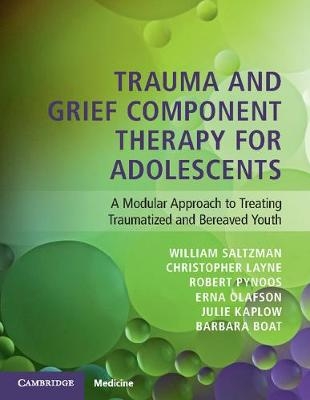
Trauma and Grief Component Therapy for Adolescents
Cambridge University Press (Verlag)
978-1-107-57904-0 (ISBN)
Developed by experts in trauma psychiatry and psychology and grounded in adolescent developmental theory, this is a modular, assessment-driven treatment that addresses the needs of adolescents facing trauma, bereavement, and accompanying developmental disruption. Created by the developers of the University of California, Los Angeles PTSD Reaction Index© and the Persistent Complex Bereavement Disorder Checklist, the book links clinicians with cutting-edge research in traumatic stress and bereavement, as well as ongoing training opportunities. This innovative guide offers teen-friendly coping skills, handouts, and specialized therapeutic exercises to reduce distress and promote adaptive developmental progression. Sessions can be flexibly tailored for group or individual treatment modalities; school-based, community mental health, or private practice settings; and different timeframes and specific client needs. Drawing on multidimensional grief theory, it offers a valuable toolkit for psychologists, psychiatrists, counsellors, and others who work with bereaved and traumatized adolescents. Engaging multicultural illustrations and extensive field-testing give this user-friendly manual international appeal.
William Saltzman, Ph.D., is a licensed clinical psychologist and holds a primary appointment as Professor of Counseling at California State University, Long Beach. Dr Saltzman also serves as Associate Director of the University of California, Los Angeles, Nathanson Family Resilience Center. For the past twenty years, Dr Saltzman has developed, disseminated, and evaluated programs for youth and families impacted by trauma, violence, illness and loss. He and the other authors regularly train and certify practitioners in how to implement TGCTA. Christopher Layne is Program Director of Education in Evidence-Based Practice at the UCLA/Duke University National Center for Child Traumatic Stress, and a research psychologist at the University of California, Los Angeles. His professional interests include adolescent traumatic stress and bereavement, developmental psychopathology, evidence-based assessment and practice, test construction, community violence, and political violence. Dr Layne is the lead developer of multidimensional grief theory, the Persistent Complex Bereavement Disorder Checklist, and the Multidimensional Grief Reactions Scale. Robert S. Pynoos, M.D., M.P.H. is a Professor of Psychiatry at the University of California, Los Angeles (UCLA) David Geffen School of Medicine, Director of the UCLA Trauma Psychiatry Program and Co-Director of the UCLA/Duke University National Center for Child Traumatic Stress, which helps coordinate the National Child Traumatic Stress Network. He has pioneered a scientific developmental framework, including a continuum of assessments and interventions. He is a past recipient of the Lifetime Achievement Award from the International Society for Traumatic Stress Studies. Erna Olafson, Ph.D., Psy.D., a clinical psychologist, is associate professor of clinical psychiatry and pediatrics emerita at the University of Cincinnati, College of Medicine and Cincinnati Children's Hospital Medical Center. She has co-directed the Center for Trauma Recovery and Juvenile Justice and chaired the Justice Consortium of the National Child Traumatic Stress Network. With her team, she has implemented Trauma and Grief Component Therapy for justice-involved youth since 2009. Julie Kaplow, Ph.D., A.B.P.P., is a licensed clinical psychologist and board certified in Clinical Child and Adolescent Psychology. She holds a primary appointment as Associate Professor in the Department of Psychiatry at the University of Texas Health Science Center at Houston. Dr Kaplow also serves as Director of the Trauma and Grief Center for Youth where she oversees evidence-based trauma- and bereavement-informed assessment and treatment, and conducts research with bereaved youth and families. Barbara Walling Boat, Ph.D., is associate professor in the Department of Psychiatry and Behavioral Neuroscience at the University of Cincinnati and Director of the Program on Childhood Trauma and Maltreatment at Cincinnati Children's Hospital Medical Center. She participated in the development, implementation and research on Trauma and Grief Component Therapy with justice-involved youth.
Introduction; TGCTA pre-treatment assessment interview: introduction, assessment, and goal setting for individual or group participation; Module 1. Foundational Knowledge and Skills: Introduction; Session 1.1 Welcome and introduction; Session 1.2 Posttraumatic and grief reactions and introduction to coping strategies; Session 1.3 Emotions and feelings; Session 1.4 Learning to cope with trauma and loss reminders; Session 1.5 Learning coping skills; Session 1.6 Sizing up a situation; Session 1.7 Identifying and replacing hurtful thoughts; Session 1.8 Recruiting effective support handouts 1.1–1.53; Module 2. Working Through Traumatic or Loss Experiences: Introduction; Session 2.1 Preparing to share personal trauma or loss experiences (sharing our stories); Session 2.2 Group narrative sharing sessions; Session 2.3 Review of group sharing and exploration of beliefs and expectations; Session 2.4 Guide for conducting individual narrative and pullout sessions; Handouts 2.1–2.15; Module 3. Working Through Grief Experiences: Introduction; Session 3.1 Learning about grief; Session 3.2 Understanding connections between loss reminders, grief reactions, and consequences; Session 3.3 Dealing with distress over the circumstances of tragic deaths; Session 3.4 Identifying positive and negative traits; Session 3.5 Reminiscing together; Session 3.6 Planning for difficult days (relapse prevention); Handouts 3.1–3.34; Module 4. Preparing for the Future: Introduction; Session 4.1 Next steps – promoting developmental progress; Session 4.2 Coping with difficult days; Session 4.3 What is and what is not your job; Session 4.4 Graduation and launching into the future; Handouts 4.1–4.25; Appendices.
| Erscheinungsdatum | 16.04.2018 |
|---|---|
| Verlagsort | Cambridge |
| Sprache | englisch |
| Maße | 216 x 279 mm |
| Gewicht | 940 g |
| Themenwelt | Geisteswissenschaften ► Psychologie ► Klinische Psychologie |
| Geisteswissenschaften ► Psychologie ► Traumatherapie | |
| Medizin / Pharmazie ► Medizinische Fachgebiete ► Psychiatrie / Psychotherapie | |
| Sozialwissenschaften ► Soziologie | |
| ISBN-10 | 1-107-57904-X / 110757904X |
| ISBN-13 | 978-1-107-57904-0 / 9781107579040 |
| Zustand | Neuware |
| Haben Sie eine Frage zum Produkt? |
aus dem Bereich


